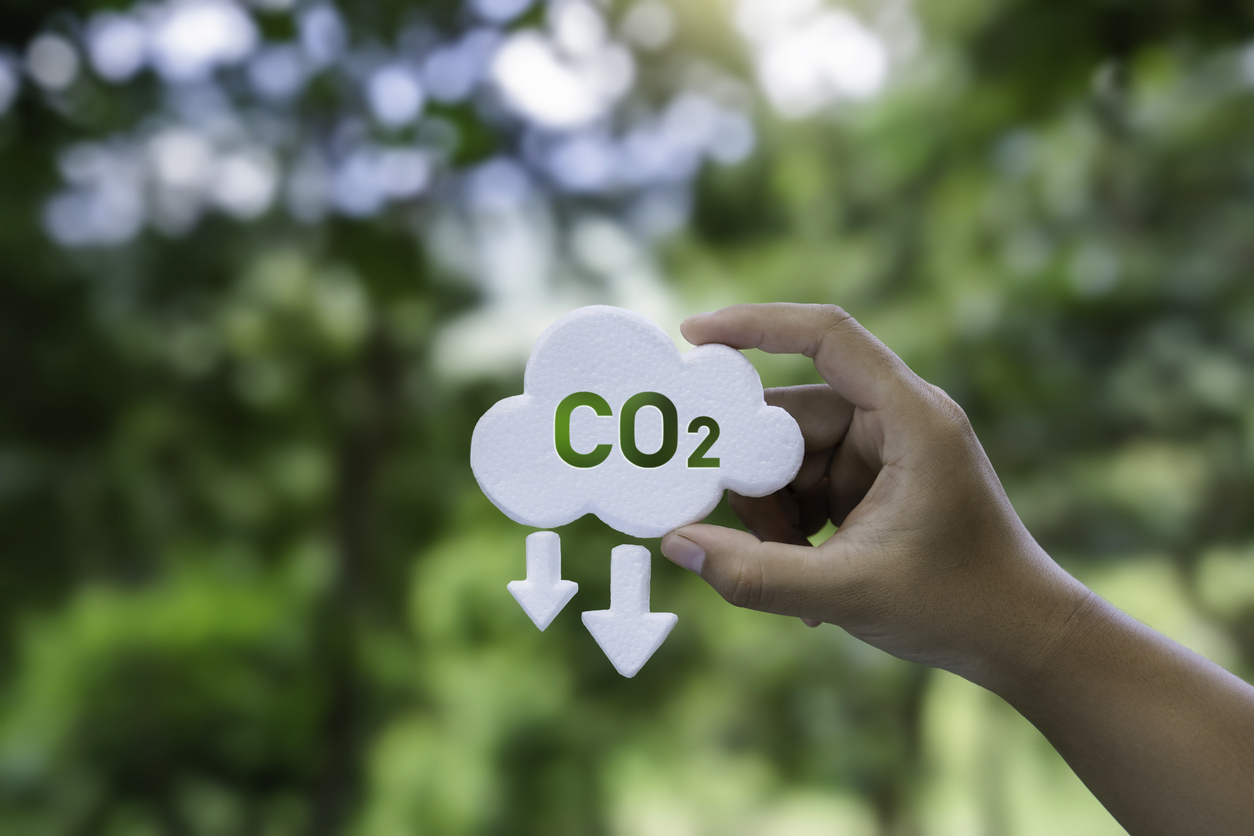
Reducing Emissions Across Our Value Chain with a Science-Based Approach
Our greatest contribution to combating the climate crisis lies in leading the transition to decarbonized energy systems. As a renewable energy leader, Zorlu Enerji collaborates with governments, customers, and industrial organizations to decarbonize energy production through geothermal, hydro, wind, and solar power solutions.
We aim to go beyond renewable energy generation by offering solutions that reduce emissions during production, installation, transportation, and operation of our renewable energy assets. These efforts actively support the global transition to a net-zero economy.
With a clear roadmap, our goal is to achieve net-zero emissions across our entire value chain (Scope 1, 2, and 3) by 2040, a target verified by the Science-Based Targets initiative (SBTi).
For more information about our goals, priorities and the work we have done to achieve these goals, you can review the details below.
Key SBTi-Approved GHG Reduction Targets
- Reduce Scope 1 emissions from electricity and heat production by 74% per MWh by 2030 and by 98% by 2040
- Reduce Scope 2 emissions by 42% by 2030 and by 90% by 2040
- Reduce Scope 1 and Scope 3 emissions from fuel and energy-related activities by 74% per MWh by 2030 and by 98% by 2040
- Reduce all other Scope 3 emissions by 25% by 2030 and by 90% by 2040
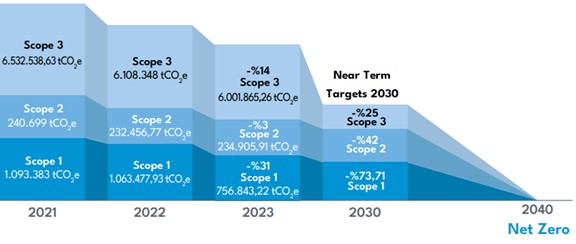
Science-based targets (SBTi) are goals developed to provide businesses with a clear roadmap to reduce greenhouse gas emissions. You can access the Zorlu Enerji SBTi Target Validation Report via the link.
SBTi Target Validation Report
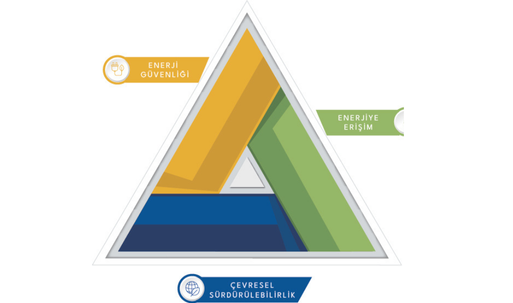
Our Business Strategy and Growth Projections Aligned with Our SBTi Targets
The climate crisis has made the energy trilemma – the balance between energy security, energy cost, and environmental sustainability – more complex. While the widespread adoption of renewable energy sources is critical for a low-carbon future, the intermittent nature of these sources makes storage technologies indispensable for ensuring energy security. In particular, energy storage solutions help integrate variable sources such as solar and wind by bridging the gaps between demand and production. These technologies not only stabilize energy supply but also reduce energy costs and contribute to environmental sustainability.
According to the International Energy Agency (IEA), global electricity storage capacity is expected to reach 500 GW as of 2023; this capacity plays a key role in reducing the pressure that renewable energy sources place on system reliability. At the same time, the transition to a sustainable energy system requires a 75% reduction in emissions from the global energy sector by 2050 (IEA, 2021 Net Zero by 2050 Roadmap). In achieving these goals, the integration of renewable energy systems along with energy storage technologies is of great importance.
Click the visuals to access information on the Energy Trilemma and the IEA Net Zero by 2050 Report.
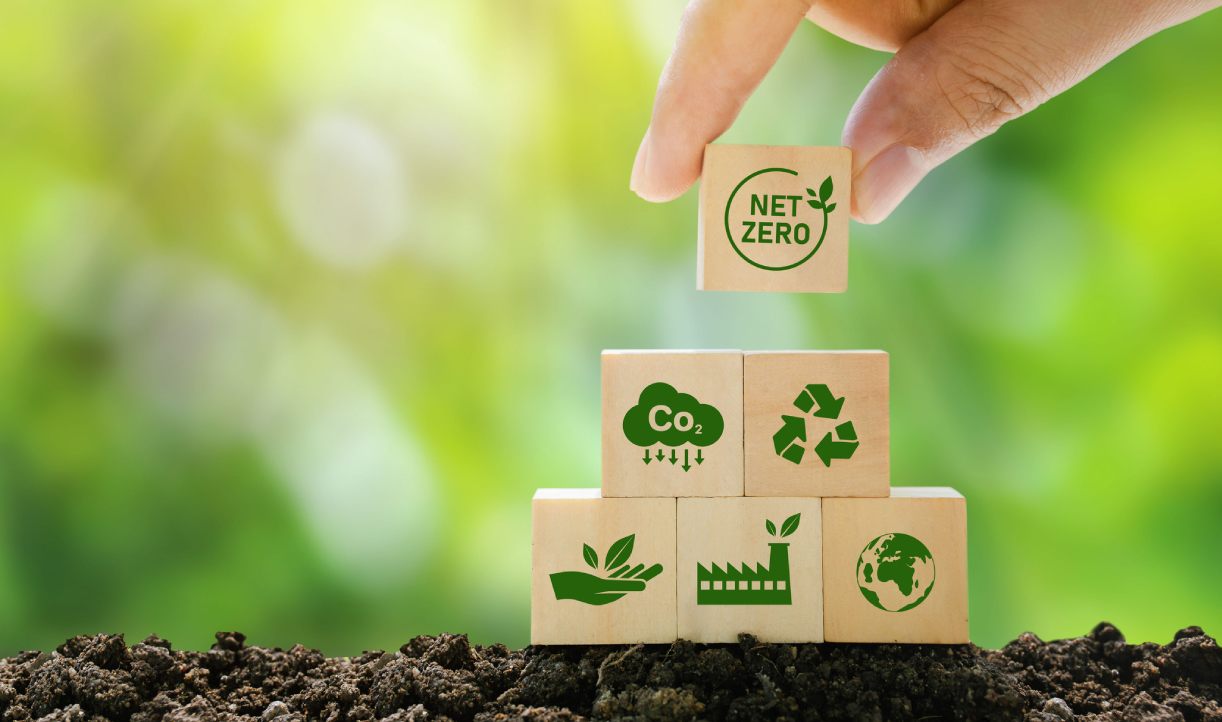
With its 2040 projections, Zorlu Enerji aims to lead the energy transition by utilizing its hybrid, solar, wind, and geothermal plant licenses. In line with its net zero commitment defined under the Science Based Targets initiative (SBTi), these projects will play a critical role not only in ensuring energy supply security but also in reducing carbon emissions. Since the energy sector is responsible for approximately 73% of global greenhouse gas emissions, Zorlu Enerji’s investments in renewable energy fulfill an important responsibility in the fight against the climate crisis.
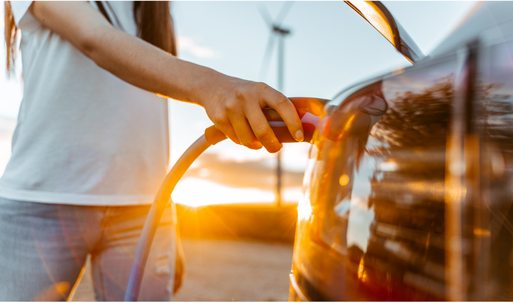
Health Benefits of E-Mobility
According to the World Health Organization (WHO), reducing PM2.5 exposure by 1 µg/m³ can prevent approximately 34 deaths per 100,000 adults annually. E-mobility significantly reduces such health risks by lowering air pollution and NOx-related respiratory and cardiovascular diseases. It also reduces noise pollution, thereby improving public health and lowering the risk of chronic diseases. The “Handbook on the External Costs of Transport” reveals that e-mobility reduces Years of Life Lost (YLL) and Years Lived with Disability (YLD). You can access the report via the link.
Handbook on the External Costs of Transport

Our Efforts to Combat the Climate Crisis
To achieve our sustainability goals, we need to reduce carbon emissions from our energy production and operations. In this regard, we have made significant progress and continue to work in line with science-based climate targets.
As Zorlu Enerji, our vision is to create a world powered entirely by renewable energy, and we aim to be one of the pioneering catalysts of this transition. This journey begins with decarbonizing our own energy production and operations (Scopes 1–2).
What We Do?
We have set our emission reduction targets in accordance with climate science, verified by the Science Based Targets initiative (SBTi). By 2040, we commit to reducing the emission intensity from our energy production and operations by 98% compared to 2021. This target includes all our operations, transportation vehicles, and sites along with heat and electricity production (Scopes 1–2).
We have taken a strategic step to gradually eliminate emissions from fossil fuels by withdrawing from thermal power plant and natural gas distribution businesses. In addition, we have moved into the planning phase of the GECO Project to implement carbon capture, utilization, and storage (CCUS) technologies for our geothermal operations.
What’s Next?
We aim to go beyond our 98% target by continuing to reduce Scope 1 and 2 emissions and lowering our emission intensity to the lowest possible levels.
We plan to certify the electricity used in all our operations as 100% sourced from renewable energy through I-REC and YEK-G certification.
Net-Zero Approval Validation Report
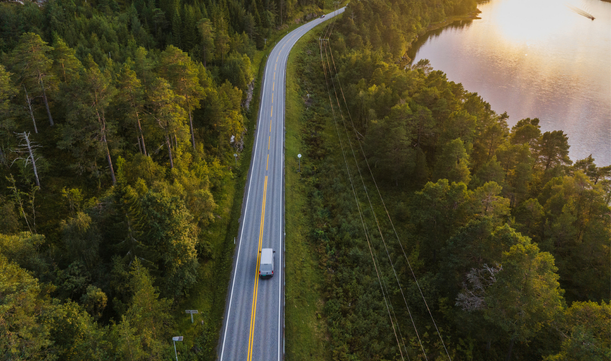
Decarbonizing Our Supply Chain
Why Are We Focusing on Supply Chain Decarbonization?
We have the most progressive decarbonization targets in the energy sector and aim to achieve net-zero greenhouse gas emissions across our entire value chain (scopes 1-3). Learn how we're reducing our scope 3 emissions from our supply chain and the use of natural gas.
As Zorlu Energy, we aim to reach net zero emissions across our entire value chain by 2040. Accordingly, we have removed the sale of natural gas and coal-based power generation assets from our portfolio from our business plans and are now focusing on reducing emissions in our supply chain.
What We Do?
We plan to gradually phase out natural gas sales and thermal-based power generation business from our business portfolio. This step will eliminate a large proportion of our scope 3 emissions. However, emissions from the generation, installation and transportation of our renewable energy assets continue to grow as our green energy investments increase. As such, supply chain decarbonization has become one of the most important and complex aspects of achieving our net-zero goal.
Supply chain emissions are outside of our direct control and are mostly from hard-to-decarbonize sectors such as procurement, logistics processes, steelmaking and heavy industry. Therefore, collaborating with other industries is critical to achieving success.
Our three key focus areas are
Monitoring and Measuring Carbon Progress:
We develop life cycle assessment (LCA) models and emission factors. We use these models to calculate the carbon footprint of our new geothermal power plants and extend them to our other technologies. We also contribute to the development of standard LCA metrics to increase transparency and data comparability.
Cooperation with Suppliers:
We are working with our key suppliers in high-carbon-intensive sectors in our supply chain to integrate decarbonization strategies into their operations. In this context, we encourage them to adopt science-based targets, make transparent climate reporting to CDP, and use renewable electricity in their production processes.
Purchase Agreements for Low Emission Products:
We contribute to the scaling of low-emission technologies and encourage suppliers' investments in this area. For example, we support innovative solutions by making purchase agreements for low-emission production in the steel industry.
What's Next?
We will continue to develop new tools to support our suppliers in their green transformation processes. We will also launch projects focusing on biodiversity, circularity and the carbon footprint of our suppliers in their own supply chains. We have integrated CDP reporting, science-based targets and 100% renewable electricity usage requirements into our contracts with our main suppliers. You can access the Decarbonization Guide we have created for our suppliers via the link
Supplier Guide
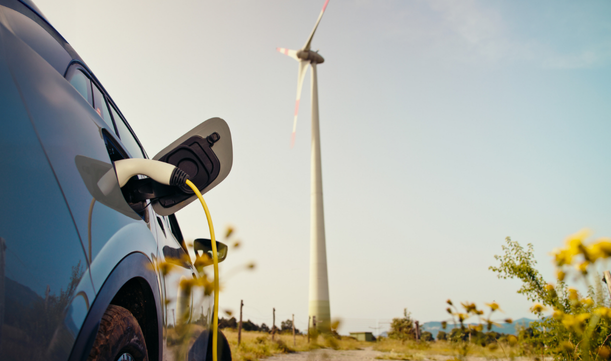
Energy Efficiency Management at Zorlu Enerji
By adopting a strategic approach that prioritizes sustainability and efficiency in energy management, Zorlu Energy aims to both reduce environmental impacts and ensure efficient use of resources. The company focuses on energy efficiency projects within the framework of ISO 50001 Energy Management System and implements innovative solutions to continuously improve energy performance. Regular energy audits are carried out in power plants such as Kızıldere and Gökçedağ to increase the effectiveness of energy management processes, and with this approach, it contributes to environmental and economic sustainability goals. For information on energy efficiency targets and projects, see.
Zorlu Enerji Energy Management

Emission Management at Zorlu Enerji
Zorlu Energy effectively carries out emission management by applying the ISO 14064 Greenhouse Gas Management System standard in the facilities where it carries out its geothermal and thermal operations. In this context, it aims to minimize environmental impacts by transparently carrying out the measurement, reporting and verification processes of greenhouse gas emissions. In addition, it implements energy efficiency projects to achieve emission reduction targets and integrates innovative technologies that reduce its carbon footprint into its operations. For detailed information on Management Systems, see.
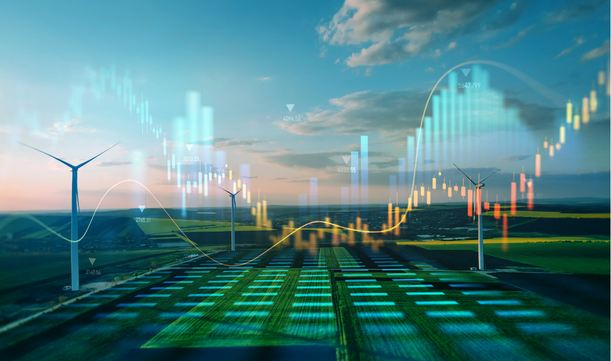
Sustainablemetrics
The Sustainable Metrics project enables Zorlu Enerji to calculate its carbon emissions and water footprint digitally, contributing to its decarbonization goals. This platform ensures fast, reliable, and error-free reporting of operational data, strengthening sustainability processes. The project highlights the role of digitalization in reducing carbon emissions.
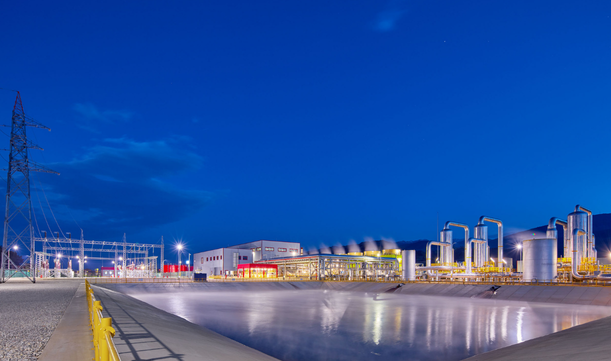
Asset Management at Zorlu Enerji
Zorlu Enerji effectively manages the integrity and functionality of its assets through an Asset Management Plan tailored for its geothermal operations. This plan integrates the Seveso Safety Management System to achieve the company’s operational availability targets. It also supports operational efficiency and sustainability objectives by establishing a comprehensive policy. This holistic approach reflects Zorlu Enerji’s commitment to operational excellence with a focus on safety and performance.

CDP Reporting and Turkey's First Forests Report
Zorlu Energy has taken an important step in line with its environmental impact and sustainability goals by publishing the CDP Forests report for the first time in Turkey in 2023. CDP provides a global platform for companies to provide transparency on critical environmental issues such as climate change, water security and forests. This reporting demonstrates Zorlu Energy's commitment to assessing and managing environmental risks, while also providing reliable data for investors and stakeholders. The company's CDP journey is a critical tool in achieving sustainability goals and supports environmental sustainability. For Zorlu Enerji's CDP journey, which has been reporting on CDP since 2008, see here.

Zero Carbon Footprint Forests Project
Zorlu Enerji launched the Zero Carbon Footprint Forests Project to combat climate change and support a sustainable future. Through the annual planting of 90,000 saplings, the project aims to achieve a Net Positive Impact by 2030.
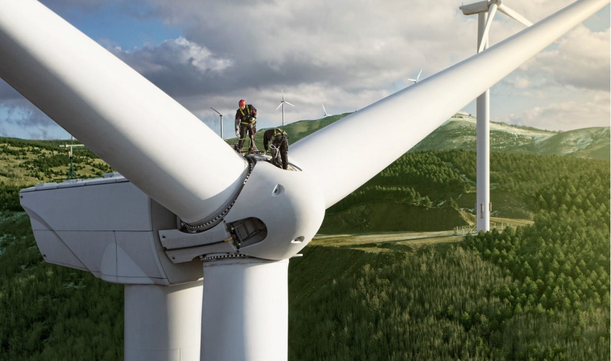
We Take Active Part in Carbon Credit Markets
Zorlu Energy generates carbon credits thanks to the renewable energy it generates through Gökçedağ WPP and Pakistan WPP projects and offers these credits to market players. These sales contribute to the carbon neutralization targets of companies, especially those operating in mandatory markets. The WPP sites are certified with internationally recognized Gold Standard and Verra certificates, and extensive work is being carried out on the GECO Project and the company's network of charging stations for sales to voluntary carbon markets. Zorlu Energy resolutely continues its efforts to build a sustainable future with its carbon-free assets.

Renewable Energy Certificates and the Path to Net Zero
Zorlu Enerji secures I-REC and YEK-G Renewable Energy Certificates to ensure that its electricity consumption is sourced from renewable resources. In 2023, renewable energy production from Alaşehir and Kızıldere 3 geothermal plants certified 342,149 MWh of electricity with I-REC. Additionally, electric vehicle charging network services offered through ZES were also certified under I-REC, underscoring our commitment to net-zero emissions.
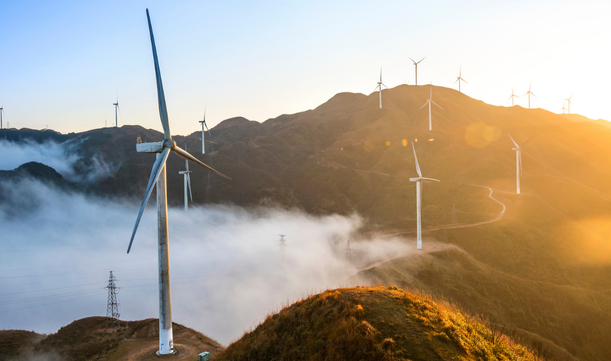
Zorlu Enerji’s proactive Steps in the Management of Climate Risks
Climate change creates critical financial and operational risks for all sectors, especially the energy sector. In order to effectively manage these risks and meet investor expectations, Zorlu Enerji has published the Task Force on Climate-Related Financial Disclosures (TCFD) Report. This report is an important step in financializing climate risks and increasing transparency, supporting the company's efforts to comply with IFRS S1 and S2 standards. While building a sustainable future, Zorlu Energy puts global climate risks and opportunities at the center of its strategic decisions.
TCFD Report
Zorlu Energy's Air Quality Management and Sustainability Efforts
Developments in the energy sector are increasing the importance of air quality management. As Zorlu Energy, we act with the vision of a clean environment and a healthy future by adopting a comprehensive air quality management strategy to minimize our environmental impacts. With a commitment to reducing the impact of air pollutants released into the atmosphere because of industrialization, energy production and human activities, we monitor, report and reduce our emissions in accordance with national and international standards.
In our geothermal and thermal power plants, we make instant emission measurements with the Greenhouse Gas Emissions Measurement System (SEÖS) and report our data to the Provincial Directorate of Environment. While using lime and high-grade coal to reduce SOx emissions in thermal power plants, we achieved a 49% and 32% reduction in NOx and SO₂ emissions, respectively, in the 2022-2023 period. We also continue to reduce our environmental footprint with reductions in dust and CO emissions. These achievements are a testament to our eco-friendly operations and commitment to our sustainability goals. You can access the mercury emission measurement report of our Lüleburgaz facility via the link
Mercury Emission Measurement Report

You can review our progress report for annual targets and progress on point emissions and energy consumption.
Electric vehicle charging stations, which are offered under the brand name "ZES" in Turkey and "Electrip" abroad, offer an important solution against air and noise pollution caused by fossil fuel vehicles.
ZORLU ENERJİ ENVIRONMENTAL TARGETS
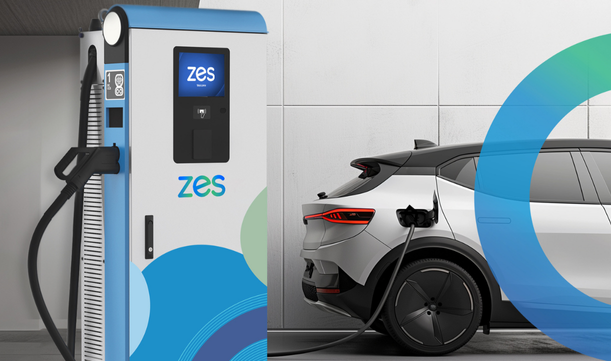
Clean Air and Sustainable Future with E-Mobility
With our Electrip and ZES brands, it plays an important role in improving air quality through its efforts to reduce the use of fossil fuel vehicles. The expansion of electric vehicles significantly reduces the emission of NOx, SO2 and PM particles into the atmosphere. In 2023, a total of 12,000 tons of CO2 emissions were avoided thanks to Electrip's activities. In addition to reducing air pollution due to fossil fuel consumption, this is also a major step in the fight against climate change. See for more information on our processes for e-mobility.
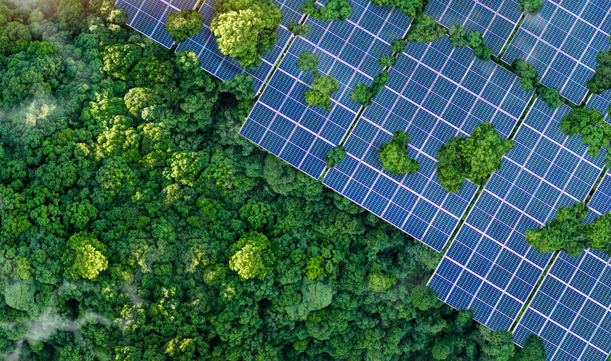
Energy of the Future: A Sustainable World with the Sun
Solar energy stands out as one of the most effective renewable energy sources in global emission management. As Zorlu Energy, we contribute to the prevention of greenhouse gas emissions with our projects and sectoral sales for solar energy. According to the International Energy Agency (IEA), global solar capacity exceeded 1 terawatt in 2023, making it possible to avoid around 1.7 billion tons of CO₂ emissions. In the light of these developments, our investments in solar energy serve the sustainability goals of both our country and the world. For more information on our processes for the solar business, see website.